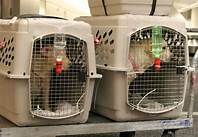Are Pets Allowed in Airplanes?
Bringing your beloved pet along on your travels can be a wonderful experience, but it's important to know the rules and regulations regarding pets on airplanes. Here's an overview of what you need to know:

Service Animals
Service animals, such as guide dogs for the blind or hearing dogs for the deaf, are generally allowed in airplanes. Airlines are required to accommodate service animals without charge, and you won't need to provide any documentation or paperwork. However, you may be asked to provide proof of your disability.
Emotional Support Animals
Emotional support animals, or ESAs, are not considered service animals and are not guaranteed to be allowed on airplanes. Airlines have the right to set their own policies regarding ESAs, and some airlines may charge a fee for ESAs.
To bring an ESA on an airplane, you will need to provide documentation from a mental health professional stating that you have a disability and that the ESA is necessary for your mental health.
Pets
Pets, such as dogs and cats, are generally not allowed in the cabin of airplanes, but some airlines do allow them to travel in cargo. If you want to bring your pet on an airplane, you will need to check with the airline to see if they allow pets in cargo and what their fees are.
There are a few things you need to keep in mind if you're planning to travel with your pet in cargo:
- Your pet must be at least 8 weeks old.
- Your pet must be in a crate that is large enough for it to stand up, turn around, and lie down comfortably.
- The crate must be made of a material that is strong enough to withstand the rigors of air travel.
- Your pet must have a health certificate from a veterinarian within 10 days of travel.
- You may need to pay a fee to bring your pet on an airplane.
Tips for Traveling with Your Pet
If you're planning to travel with your pet, here are a few tips to make the experience as smooth as possible:
- Book your pet's flight early. Airlines often have a limited number of spaces for pets, so it's important to book your pet's flight as early as possible.
- Arrive at the airport early. You will need to allow extra time to check your pet in and go through security.
- Make sure your pet is comfortable in its crate. Place a blanket or towel in the crate to make it more comfortable for your pet.
- Give your pet plenty of water and food before the flight. Avoid giving your pet any food or water within 4 hours of the flight.
- Stay calm and reassuring. Your pet will be able to sense your anxiety, so it's important to stay calm and reassuring throughout the flight.
Declaration: All article resources on this website, unless otherwise specified or labeled, are collected from online resources. If the content on this website infringes on the legitimate rights and interests of the original author, you can contact this website to delete it.






